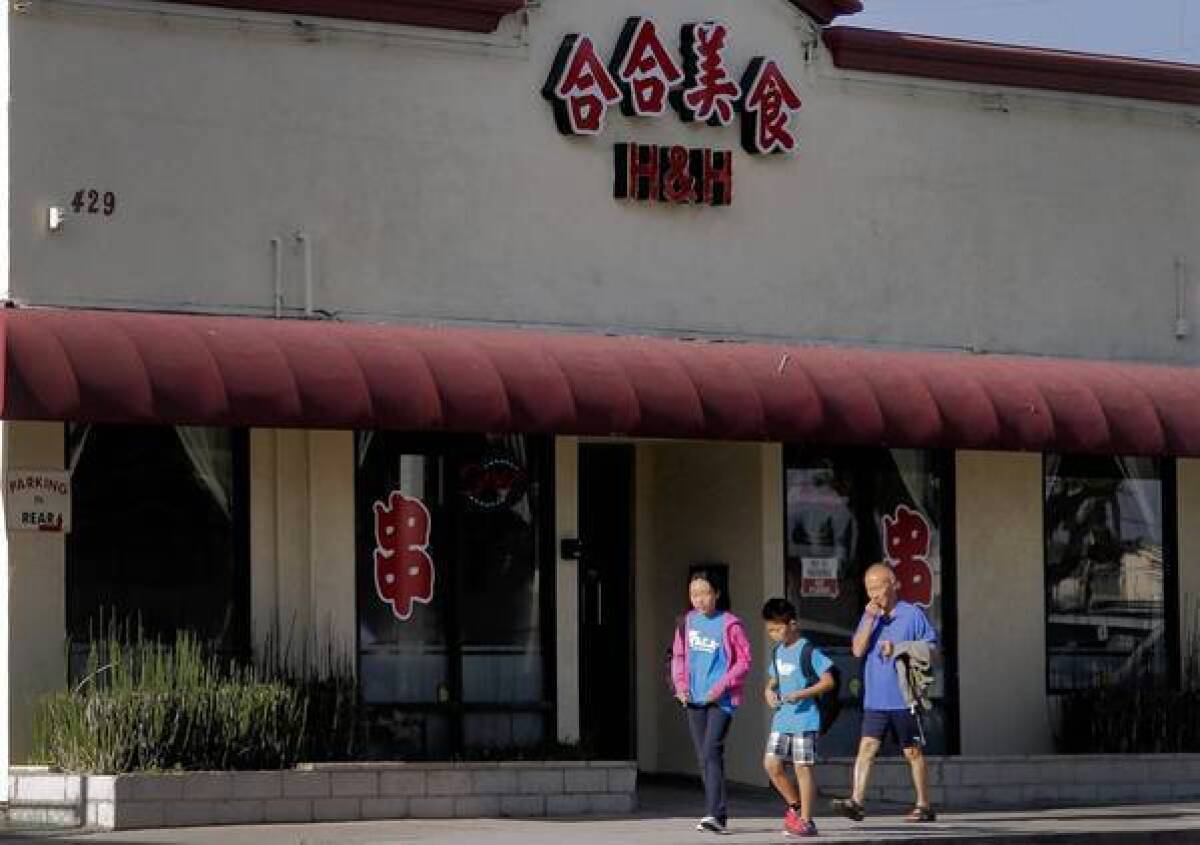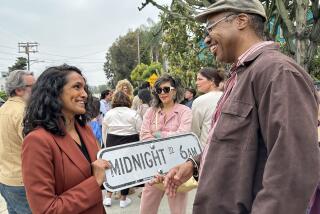Monterey Park sign ordinance debate recalls ‘80s ethnic controversy

Monterey Park officials are reliving a decades-old racial controversy as they revise a law regulating the use of English on signs.
As part of a general revision of old codes, the City Council changed a law that required some English on storefront signs because of fears that the language in the measure was unconstitutional. A proposed amendment, to be considered this week, requires the use of “modern Latin” letters on storefront signs.
It’s actually a looser requirement than the old law, which called for English words, not just letters. But that was lost in translation. After unanimously giving first approval to the ordinance last week, city leaders in the majority-Asian community say they’ve been inundated with negative media coverage and calls from upset residents.
“It has kind of spiraled,” Mayor Teresa Real Sebastian said.
Now some city leaders are beating a hasty retreat. One council member wants to avoid regulating language on signs altogether, and another said he would make a motion to delay action on the ordinance when it goes up for the second reading Wednesday.
The sudden furor and quick backtrack suggest a sea change in city politics from the racially charged 1980s, when Chinese immigrants rapidly transformed Monterey Park.
At the time, English-language requirements for commercial signs were hallmarks of a larger racial conflict. Three council members tried to get English declared the official language of the city and sponsored ordinances that would require all signs to use only English. Community groups launched recall efforts.
A wave of demographic change washed away much of the strife. Since 1980, census records show, the Asian population of Monterey Park has nearly doubled, nearing 67% in 2010. Four of five council members in office have Chinese last names.
Drive down Valley Boulevard or Garvey Avenue in Monterey Park and you’ll find mostly Chinese signs with a few begrudging, somewhat cryptic, letters in English. One northern Chinese restaurant whose Mandarin name evokes beauty and equality is known simply as “H&H.;” Others use such easily remembered acronyms as “ABC,” or they forgo English altogether.
This latest attempt to regulate signs, city leaders say, isn’t about race. Across the San Gabriel Valley, cities such as Rosemead, Temple City, San Marino and San Gabriel all have some requirements for English or English lettering on commercial signs.
English requirements for signs are about public safety, city leaders say. Police and firefighters who can’t read the languages of the ethnic communities they work in need some way of identifying businesses during emergencies.
Police Chief Jim Smith said no public safety incident prompted the code change. He supported it, he said, because it would help police officers do their jobs. Fire Chief Jim Birrell also supported the change in a letter to the City Council.
An informal “windshield” survey indicated that just one business would be affected by the change, according to City Atty. Mark Hensley, and he says the new language actually brings more business owners into compliance.
But for many residents, sign language is still “a sensitive, emotional issue,” Councilman Hans Liang said.
He initially voted for the change because he thought it would help firefighters and police officers do their jobs. Now he wants to delay action because, he says, it is a solution in search of a problem.
“There needs to be a better way of addressing this rather than making an ordinance,” Liang said.
John Man, president of the Monterey Park Chamber of Commerce, said he wants city officials to proceed more carefully. Many business owners didn’t know the city had laws on the use of English on signs, Man said.
“The business owners need to hear the reason for the change first,” Man said.
Former state Assemblyman Mike Eng, who served on Monterey Park’s council beginning in 2003, recalls when the issue splintered the city into ethnic coalitions. But he says the city has moved on.
“It’s something that used to divide us,” Eng said. “But that political battle that has run its course.”
More to Read
Sign up for Essential California
The most important California stories and recommendations in your inbox every morning.
You may occasionally receive promotional content from the Los Angeles Times.











